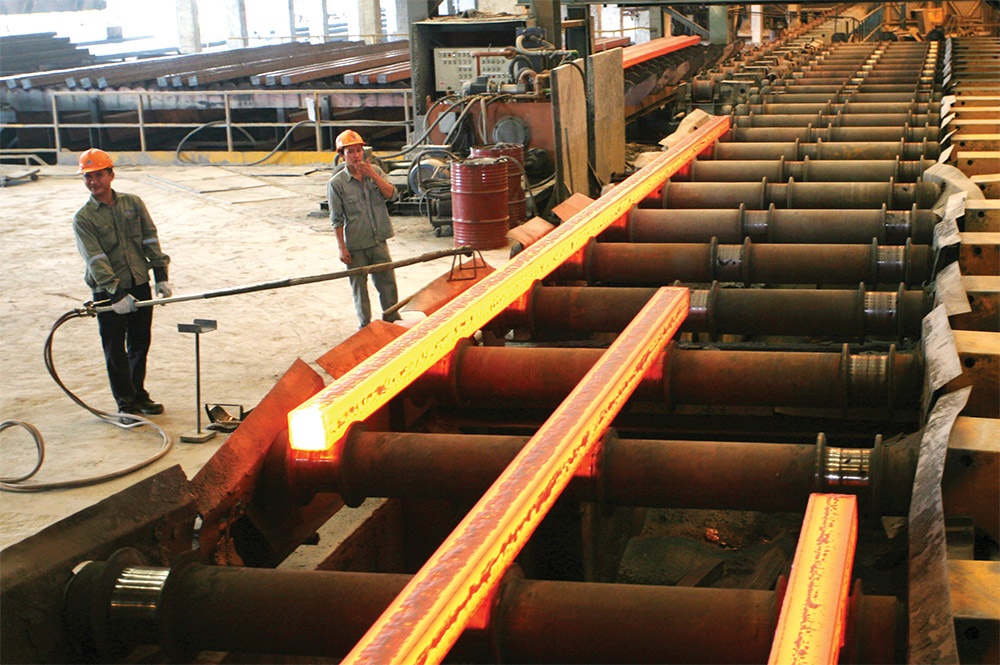Carbon market pilot around the corner
By the end of July, the Ministry of Natural Resources and Environment (MoNRE) will submit a decree amending and supplementing Decree No.06/2022/ND-CP, which regulates greenhouse gas (GHG) emission mitigation and conservation of the ozone layer, according to a report from the ministry.
“The decree will have additional regulations on inventory, appraisal, emission quota allocation, carbon market organisation, and carbon credit exchange activities on the international markets,” said Deputy Minister of Natural Resources and Environment Le Cong Thanh.
“It is expected that in the pilot phase, manufacturing establishments with high emissions in three fields, namely thermal power, iron, and steel production (about 100 establishments) will be included in the list of fields and establishments that must be inventoried.”
 |
| Steel production is likely to be among the high-emitting fields that must partake in a pilot on inventory and emission quota allocations Photo: Le Toan |
Promulgating the decree amending and supplementing Decree 06 is an important factor in establishing a carbon market because the goods for trading on carbon markets are GHG emission quotas and carbon credits. The entities participating in trading quotas are establishments allocated quotas.
The Ministry of Finance, in collaboration with the MoNRE and relevant entities, is working to complete a carbon credit market development project. Deputy Minister of Finance Le Tan Can said that carbon market transactions were proposed to be made on an online platform. It is expected that the roadmap for carbon market development will include two phases: the pilot phase from 2025 to 2027 and the official operation from 2028.
“Groups of solutions include GHG inventory and allocation of emission quotas; carbon credit management; emission quota and carbon credit trading systems; management, inspection, and supervision; and awareness improvement and capacity enhancement,” said Can. “Specific tasks include perfecting legal policies; building a system for credit trading and organising and operating the carbon market; and communication programmes to raise awareness of the carbon market among target groups.”
Deputy Prime Minister Tran Hong Ha assigned specific missions when building the project. “The establishment is difficult and complex, with many developments and changes, requiring a unified commitment to global-scale implementation,” said Ha.
“The MoNRE, based on Nationally Determined Contributions, allocates emission quotas for each field, industry, and enterprise; guides ministries, sectors, businesses, and consulting organisations on calculation formulas, measurements, statistical reports, and appraisals relating to emission quotas and carbon credits. From there, ministries and sectors concretise it into technical regulations to monitor emission quotas as well as emission reduction plans in the areas under their management,” he added.
Ha also assigned the MoNRE to study the carbon tax system, which is compatible with international practices in collaboration with the principle of isomorphism.
To accelerate the completion of the project, the attached steering committee requested the Ministry of Transport, the Ministry of Construction, and the Ministry of Agriculture and Rural Development to complete the promulgation of technical regulations on GHG emissions inventory and measurement, reporting, and appraisal for fields under their management. Ministries and sectors are urged to issue plans to reduce GHG emissions under their management.
To help businesses achieve their GHG emission reduction goals flexibly and at low cost, the government has stipulated the establishment of a domestic carbon market or emissions trading system (ETS), as mentioned in Decree 06.
However, the successful establishment and effective regulation of an ETS in Vietnam will require extensive capacity-building initiatives and activities aimed at increasing ETS literacy among relevant stakeholders, including policymakers in the country.
“The main objective is to develop and organise training courses on ETS for various stakeholders, including policymakers, research institutes, universities, financial institutions, media representatives, and especially big emitters that will be covered under Vietnam’s ETS in the future,” said Dang Hong Hanh, co-founder and managing director of Energy and Environment Consultancy JSC.
“The training courses will utilise a carbon market simulation tool tailor-made to Vietnam’s context and provide knowledge on the ETS based on a web-based platform to raise stakeholders’ awareness and readiness for the future ETS in Vietnam,” she added.
In Vietnam, more than 300 programmes and projects have registered to be implemented with carbon credit mechanisms. Of these, about 150 have been granted more than 40.2 million carbon credits, which have been exchanged on the world carbon market, according to the MoNRE.
 | Key components can provide basis for carbon credit market Companies in Vietnam must begin to report their carbon inventory and participate in carbon credit exchanges. Lam Nguyen Hoang Thao, senior associate at Russin & Vecchi, provides deep analysis of the issue. |
 | Denmark to introduce world's first livestock carbon tax Denmark will introduce the world's first carbon tax on livestock, a unique measure designed to bring the Scandinavian country closer to its goal of carbon neutrality by 2045. |
 | Microsoft seals carbon capture deal with Occidental Tech giant Microsoft on Tuesday inked a record carbon capture agreement with Occidental Petroleum subsidiary 1PointFive, as major technology companies grapple with the growing carbon footprint of artificial intelligence. |
 | Investment in Vietnam’s carbon market: the opportunities and the challenges The growing demand for carbon credits ranks high in Vietnam. As global awareness and regulatory pressures on climate change increase, the demand for carbon credits is expected to rise. |
What the stars mean:
★ Poor ★ ★ Promising ★★★ Good ★★★★ Very good ★★★★★ Exceptional
Related Contents
Latest News
More News
- Trung Nam-Sideros River consortium wins bid for LNG venture (January 30, 2026 | 11:16)
- Vietnam moves towards market-based fuel management with E10 rollout (January 30, 2026 | 11:10)
- Envision Energy, REE Group partner on 128MW wind projects (January 30, 2026 | 10:58)
- Vingroup consults on carbon credits for electric vehicle charging network (January 28, 2026 | 11:04)
- Bac Ai Pumped Storage Hydropower Plant to enter peak construction phase (January 27, 2026 | 08:00)
- ASEAN could scale up sustainable aviation fuel by 2050 (January 24, 2026 | 10:19)
- 64,000 hectares of sea allocated for offshore wind surveys (January 22, 2026 | 20:23)
- EVN secures financing for Quang Trach II LNG power plant (January 17, 2026 | 15:55)
- PC1 teams up with DENZAI on regional wind projects (January 16, 2026 | 21:18)
- Innovation and ESG practices drive green transition in the digital era (January 16, 2026 | 16:51)

 Tag:
Tag:




















 Mobile Version
Mobile Version